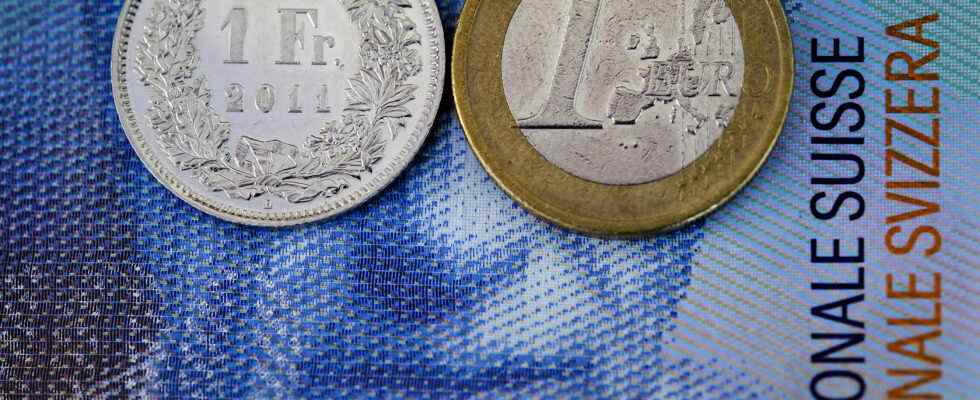(BFM Bourse) – In addition to the king dollar, the Swiss franc is breaking records against the euro, taking full advantage of its status as a safe haven. The strength of the Swiss currency is better accepted than in 2015, bringing a welcome boost to the Swiss economy. A strong Swiss franc mitigates the effect of rising energy and imported goods prices.
The Swiss franc is breaking records against the euro, giving the Swiss economy a one-off boost as central banks battle inflation, although economists remain cautious for the coming months.
Safe haven par excellence, the Swiss currency briefly hit a high on Monday after the Italian elections at 0.94 francs against 1 euro. Although it has since loosened some ballast, it is nevertheless at the highest levels since the launch of the single currency more than twenty years ago, with the exception of a brief flash crash in 2015.
“It is more a question of a weakness of the euro than of the strength of the Swiss franc”, deciphered Maxime Botteron, economist at Credit Suisse, during an interview with AFP, who cites as proof the movements well lesser of the franc against the dollar. “European growth is showing signs of running out of steam, even of recession”, he explains, stressing that “these signs come in a context where the Swiss National Bank (SNB) has changed its monetary policy”.
A welcome help
The Swiss central bank has abandoned the negative rate it has imposed since 2015 to combat the overvaluation of its currency. Like other central banks, it seeks to prevent inflation from taking root. But in the midst of soaring energy prices, this appreciation of the franc is providing it with welcome help in curbing the rise in prices.
“In Switzerland, two-thirds of inflation is due to imports. An appreciation of the Swiss franc therefore reduces the appreciation of these goods a little”, continues Mr. Botteron, who believes that the SNB “therefore has less need to tighten monetary policy” than other central banks.
In August, inflation rose to 3.5%, its highest level in 29 years, far behind the rise of 9.1% recorded the same month in the euro zone. For the SNB, “there is a very clear strategy which consists in protecting Switzerland against the rise in inflation coming from the euro zone, the United States and other trading partners”, notes Thomas Flury, global director of currency strategy at UBS.
And this time, the appreciation of the franc is not causing a wind of panic as in 2015. Exporting companies were then seriously worried about a surge of fever in the franc, fearing that their production costs would explode and their prices exports to swell. “High inflation in the euro zone makes the real appreciation much less spectacular than in the past”, he remarks.
A situation accepted by companies
“The situation is accepted because companies in Switzerland prefer to have a higher Swiss franc than discussions on wage increases” like those that “French or German companies are going to have to lead”, according to the UBS strategist.
If this appreciation of the franc eases some pressure on their imports, Swiss companies, with well-filled order books, also have some leeway to increase their prices, notes the Credit Suisse economist. “For exporters, the higher inflation in the euro zone allows them to pass on the appreciation of the rise in their costs and the exchange rate,” explains Mr Botteron.
In tourism, another sector sensitive to the exchange rate, this rise in the franc has enabled Swiss hoteliers to increase their prices in lesser proportions than in neighboring countries given the lower inflation, said a spokesperson. d’hôtellerie Suisse to AFP.
“For hoteliers, this means that they should even gain in competitiveness with foreign countries,” he explained. However, Switzerland remains an expensive destination, this employers’ organization remains cautious about the risk that “consumer budgets are tightening.” However, this boost to the Swiss economy may only be short-lived.
“We will have to see how the situation evolves this winter,” judges the UBS strategist. Even if it is “too early to estimate how the situation will evolve”, a recession or weak growth in the European economy would reduce the volumes of Swiss companies and “discussions on the franc could become a more sensitive subject than today,” he said.
(With AFP)
SS – ©2022 BFM Bourse
